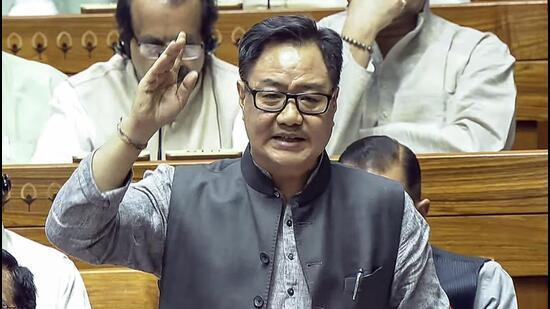
Opposition Creates Confusion & Leaves House: Rijiju in Rajya Sabha
Recently, the Rajya Sabha witnessed a heated debate on the Waqf (Amendment) Bill, with Union Minister Kiren Rijiju criticizing senior members of the Opposition for creating confusion and raising issues without staying back to listen to the replies. The remarks by Rijiju, who is the Minister of State for Home Affairs, have sparked a fresh controversy in the Upper House of Parliament.
The debate on the Waqf (Amendment) Bill took place on Thursday, with several senior members of the Opposition, including Kapil Sibal, participating in the discussion. However, Rijiju took umbrage with Sibal’s comparison of the properties of Waqf bodies with those of other religious bodies, terming it as an attempt to create confusion.
Rijiju, while participating in the debate, accused Sibal of trying to mislead the House by comparing apples with oranges. He claimed that Sibal was creating confusion by comparing the properties of Waqf bodies with those of other religious bodies, and that this was an attempt to divert attention from the main issue at hand.
The Minister’s remarks were met with resistance from the Opposition, with several members, including Sibal, accusing Rijiju of being dismissive and aggressive during the debate. Sibal, who is a senior advocate and a former Union Minister, claimed that Rijiju was trying to browbeat him and prevent him from raising legitimate questions.
However, Rijiju remained unapologetic, reiterating that Sibal’s comparison was an attempt to create confusion and mislead the House. He claimed that Sibal was not interested in listening to the replies to his questions, but was instead trying to create a spectacle and grab the headlines.
Rijiju’s comments have sparked a fresh controversy in the Rajya Sabha, with many Opposition members accusing him of being aggressive and dismissive. Several members, including Sibal, have questioned Rijiju’s behavior, claiming that it was unbecoming of a Minister to behave in such a manner.
The Waqf (Amendment) Bill is aimed at amending the Waqf Act, 1995, which deals with the management and administration of Waqf properties in the country. The Bill seeks to alter the composition of the Central Waqf Council, the apex body responsible for the management of Waqf properties, and to provide for the appointment of a Chairperson and members of the Council.
The Bill has been opposed by several Opposition members, who have raised concerns about the proposed changes and the potential impact on the management of Waqf properties. However, the government has defended the Bill, claiming that it is aimed at improving the management and administration of Waqf properties and providing greater transparency and accountability.
The debate on the Waqf (Amendment) Bill is just the latest in a series of controversies that have plagued the Rajya Sabha in recent months. The Upper House has been witnessing frequent disruptions and adjournments, with several Opposition members accusing the government of being insensitive and dismissive of their concerns.
The opposition to the Waqf (Amendment) Bill is just one example of the growing tensions between the government and the Opposition in the Rajya Sabha. The government has been accused of being authoritarian and dismissive of Opposition concerns, while the Opposition has accused the government of being insensitive and neglecting the needs of the people.
In conclusion, the debate on the Waqf (Amendment) Bill has highlighted the growing tensions between the government and the Opposition in the Rajya Sabha. The controversy sparked by Rijiju’s remarks has once again highlighted the need for greater civility and decorum in the Upper House of Parliament.
It is essential for the government and the Opposition to work together to find a solution to the problems facing the country, rather than engaging in petty squabbles and controversies. The Waqf (Amendment) Bill is an important piece of legislation that has the potential to improve the management and administration of Waqf properties in the country. However, its passage is likely to be delayed due to the growing tensions between the government and the Opposition.
Source:






